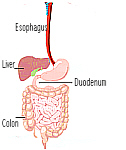Dyspepsia (indigestion) is incomplete or imperfect digestion, usually accompanied by a sense,
of fullness after eating, eructation, nausea and vomiting, heartburn, acid regurgitation,
accumulation of gas, belching, and loss of appetite. The symptoms may occur irregularly
and in different patterns from time to time. The symptoms are much more marked during times
of stress. Dyspepsia is not a disease itself, but symptomatic of other diseases or disorders.
Dyspepsia may be due to excessive acidity in the stomach (acid dyspepsia), by excessive use
of alcoholic beverages (alcoholic dyspepsia), or by faulty function of the stomach and
intestines (gastrointestinal dyspepsia). Additionally, dyspepsia may be caused by a liver
disease (hepatic dyspepsia) or found during heart disease (cardiac dyspepsia). It may even be
present during hysterial attacks.
Helpful Links:
Dyspepsia
(Indigestion)
echnically, dyspepsia,
or indigestion, is the inability to properly digest food. Indigestion is often caused
by an overproduction of stomach acid, and sometimes, by a shortage of acid. Many times
the cause is a faulty esophageal sphincter, the valve between stomach and esophagus, which
may fail to close properly, thereby allowing partially digested food and stomach acid to
come back up in the throat. Stress and anxiety are also oftentimes at fault in dyspepsia.
Chronic indigestion attacks may signal an underlying problem such as peptic ulcer, chronic
appendicitis, or hiatal hernia. A definitive diagnosis is always important before
beginning treatments.
 Many herbs are effective in alleviating some
of the symptoms of dyspepsia. Some help relieve gas pains or cramps.
Chamomile is especially
helpful in dispelling gas, soothing the stomach, and relaxing the muscles that move food
through the intestines. Another herb that helps dispel gas is
Ginger. It also stimulates
digestion and reduces irritation and, like Chamomile, helps move food through the intestines.
Biliary dyspepsia is due to insufficient quantity or quality of bile secretions.
Dandelion contains a
bitter, milky juice with the active principle, taraxacin, which is known to stimulate bile
secretion. Bitter herbs are well known to stimulate digestive functions by increasing saliva
production and promting stomach acid and digestive enzyme production.
Devil's Claw, a potent
bitter, stimulates the stomach and increases gastric digestive enzymes that help digest
proteins and fat. Gentian root, contains some of the most bitter substances known, particularly the glycosides
gentiopicrin and amarogentin; therefore, it stimulates secretion of saliva in the mouth and
hydrochloric acid in the stomach, aiding digestion;
Wormwood increases bile and
stimulates poor appetite. The volatile oil in Juniper has proven useful in many gastrointestinal ailments.
Many herbs are effective in alleviating some
of the symptoms of dyspepsia. Some help relieve gas pains or cramps.
Chamomile is especially
helpful in dispelling gas, soothing the stomach, and relaxing the muscles that move food
through the intestines. Another herb that helps dispel gas is
Ginger. It also stimulates
digestion and reduces irritation and, like Chamomile, helps move food through the intestines.
Biliary dyspepsia is due to insufficient quantity or quality of bile secretions.
Dandelion contains a
bitter, milky juice with the active principle, taraxacin, which is known to stimulate bile
secretion. Bitter herbs are well known to stimulate digestive functions by increasing saliva
production and promting stomach acid and digestive enzyme production.
Devil's Claw, a potent
bitter, stimulates the stomach and increases gastric digestive enzymes that help digest
proteins and fat. Gentian root, contains some of the most bitter substances known, particularly the glycosides
gentiopicrin and amarogentin; therefore, it stimulates secretion of saliva in the mouth and
hydrochloric acid in the stomach, aiding digestion;
Wormwood increases bile and
stimulates poor appetite. The volatile oil in Juniper has proven useful in many gastrointestinal ailments.
 Carminatives ease gas cramps and flatulence,
reduce localized inflammation, and act as mild anti-microbials. Herbs such as Chamomile and
Ginger, mentioned above, have a carminative affect on dyspepsia, as does
Turmeric root which increases
bile, thus aiding in fat digestion.
Oregano Oil also has
carminative and antispasmodic effects.
Carminatives ease gas cramps and flatulence,
reduce localized inflammation, and act as mild anti-microbials. Herbs such as Chamomile and
Ginger, mentioned above, have a carminative affect on dyspepsia, as does
Turmeric root which increases
bile, thus aiding in fat digestion.
Oregano Oil also has
carminative and antispasmodic effects.
 These
products are available from our
Virtual Store.
Our liberal
Money Back Guarantee applies.
These
products are available from our
Virtual Store.
Our liberal
Money Back Guarantee applies.